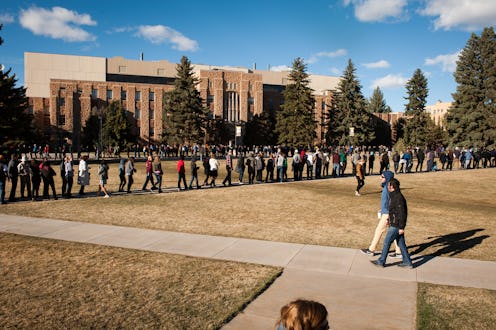News
Wyoming Wasn't Always So Conservative
Wyoming, which casts its vote in the Democratic primary on Saturday, isn’t exactly the most liberal state in the country. In fact, it’s one of the most conservative states in the country and has been for a while. It’s very rural and very white, both of which are harbingers of conservatism, and is responsible for giving us, among other things, Dick Cheney. And yet Wyoming is nicknamed “The Equality State,” because amazingly, it was an epicenter for women’s rights during its infancy.
It wasn't until 1890 that Wyoming attained statehood. But in 1869, when it was merely a U.S. territory, lawmakers passed and the territorial governor signed a bill explicitly granting the women the right to vote and hold office. It was the first territory or state to do so.
Twenty years later, when the territory was formally attempting to gain U.S. statehood, Wyoming reached another milestone. During the territory’s constitutional convention, the delegates insisted on including a provision in the state constitution that guaranteed voting rights to all of the state’s residents, regardless of gender. This was already the law in Wyoming, and yet codifying it into the state constitution was a much bigger deal. It's a lot easier to change a law than pass a constitutional amendment, and so putting women's suffrage in the state constitution gave women voters a degree of protection that the 1869 law didn't.
There’s a big caveat to all of this, though. The Wyoming’s residents who helped enact these pro-woman measures weren’t necessarily acting out of an earnest desire to advance women’s equality. There were other motivations at play; namely, the fact that Wyoming’s population at the time was both very small and disproportionately male.
Thanks to its low number of residents, Wyoming was in danger of not reaching the population threshold required for statehood. Meanwhile, the 6 to 1 man-woman ratio was, well, not ideal for many of the men living in the territory. These two factors provided a strong incentive for Wyoming to try and convince more women to move to the state. Expanding suffrage to women was one way in which it sought to do this.
But even if this was a solely political calculation, that doesn’t make it less laudable. After all, the result was that women could, for the first time in American history, vote and hold office, and that's a monumental accomplishment regardless of the motivation behind it. What’s more, Wyoming continued to make strides in gender equality even after it became a state. It was the first state to have an all-woman jury (1870), the first to elect a woman to statewide office (1894), and the first to elect a female governor (1925). Between 1920 and 1921, it also had the first town (Jackson) to be governed entirely by women.
Nowadays, Wyoming isn’t known for its liberalism. But in its nascent days, both as a territory and then a state, it was nothing less than a pioneer for gender equality in America.
There are a couple of reasons to suspect that Bernie Sanders will win the state’s caucus on Saturday, but who knows? If Wyoming can elect the first woman governor in the country, it’s perfectly conceivable that it will might also help elect the first woman president.
